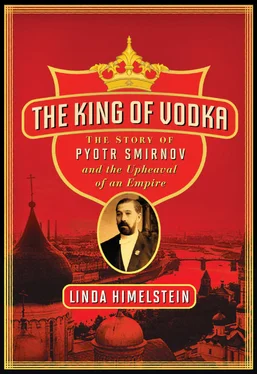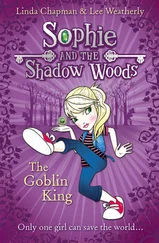Linda Himelstein
THE KING OF VODKA
The Story of Pyotr Smirnov and the Upheaval of an Empire
To my family, the best there is
A man comes from the dust and in the dust he will end—and in the meantime, it is good to drink a sip of vodka.
—OLD RUSSIAN PROVERB
Main Family Characters
Pyotr Arsenievich Smirnov The King of Vodka
Mariya Nikolayevna Smirnova Smirnov’s third wife
Arseniy Smirnov Smirnov’s father
Grigoriy Smirnov Smirnov’s uncle
Ivan Smirnov Smirnov’s uncle
Pyotr Petrovich Smirnov Smirnov’s eldest son
Nikolay Petrovich Smirnov Smirnov’s second-eldest son
Vladimir Petrovich Smirnov Smirnov’s third-eldest son
Sergey Petrovich Smirnov Smirnov’s fourth-eldest son
Aleksey Petrovich Smirnov Smirnov’s youngest son
Aleksandra Petrovna Smirnova Smirnov’s youngest daughter
Supporting Family Characters and Others Connected to Them
Matryona Smirnova Smirnov’s mother
Venedikt Smirnov Smirnov’s uncle
Eugeniya Ilyinichna Smirnova Pyotr Petrovich’s wife
Aleksandra Pavlovna Smirnova Vladimir Petrovich’s second wife, mother of his son
Tatiana Smirnova-Maksheyeva Vladimir Petrovich’s third wife and memoirist
Valentina Piontkovskaya Operetta star and Vladimir’s lover
Martemyan Borisovskiy Aleksandra Smirnova’s lover, later husband
Konstantin Petrovich Bakhrushin Smirnov’s son-in-law
Arseniy Petrovich Smirnov Smirnov’s grandson born to Pyotr
Vladimir Vladimirovich Smirnov Smirnov’s grandson born to Vladimir
Nikolay Venediktovich Smirnov Smirnov’s cousin and vodka factory director
Oleg Smirnov Smirnov’s grandson born to Sergey
Boris Smirnov Smirnov’s great-great-grandson, through Aleksey’s line
Smirnov’s Vodka Producing Rivals
Aleksander Shtriter
Kamill Deprés
M. A. Popov
Nikolay Shustov
Emile Rouget
Keller & Co.
Key Members of the Russian Bureaucracy
Tsar Aleksander II Known by some as the Great Reformer
Tsar Aleksander III Proponent of the vodka monopoly
Tsar Nikolay II Last Russian Tsar
Ivan Vyshnegradskiy Minister of Finance 1887–1892
Sergey Witte Minister of Finance 1892–1903
Revolutionaries
Vladimir Lenin Leader of the Bolshevik Party
Leon Trotskiy Lenin’s number two and Commander of the Red Army
Josef Stalin Future leader of the Soviet Union
Key Literary Figures
Lev Tolstoy Outspoken Temperance Advocate
Anton Chekhov Critic of Smirnov and other vodka makers
Maxim Gorkiy Chronicled the Russian Revolution
Fyodor Dostoevskiy Anti-alcohol, anti-merchant advocate
Aleksander Ostrovskiy Playwright, outspoken critic of merchants
This historical narrative account is based on exhaustive research conducted over more than four years in the United States and Russia. Information included in the book was gleaned from over 500 archival documents, approximately 250 articles from periodicals and newspapers, more than 900 books, and interviews with a dozen or more leading experts in related fields. In some instances, primary sources could not be found at all, were incomplete, or in conflict with other sources. In these cases, available documentation and relevant historical context were relied upon to provide likely accounts of events. In other circumstances, corroborating evidence supporting personal recollections or viewpoints could not be found. For example, some of Vladimir Smirnov’s many remembrances, recorded by his third wife, could not be verified. Notations have been included throughout the book to alert readers to these occasions wherever possible.
Citations, both in English and Russian, are extensive, though they do not include references for facts that are widely known or accepted. And unless otherwise noted, translations of Russian documents were provided by Tatiana Glezer. Names in the book are transliterated into a hybrid of Russian and English spellings to retain their Russian feel but make them easier to read. In addition, Russia followed the Julian calendar until January 31, 1918. Thus, all dates prior to that time are given according to the Julian, not Gregorian, calendar. Finally, converting nineteenth-and early twentieth-century Russian rubles into today’s dollar equivalents proved to be a particularly daunting challenge. An elaborate three-step process was developed to make this calculation with the help of Sofya Alekseyevna Salomatina, coordinator of the Center for Economic History at Moscow State University, and an indispensable resource by Samuel Williamson titled Six Ways to Compute the Relative Value of a U.S. Dollar Amount, 1774 to Present.
The smell of mud and wet stone hung in the air. Moscow had been in the midst of an unusually warm spell. It was already late November, yet dandelions and daisies were poking out of the earth, nurtured by a steady balmy drizzle. The few flakes of snow that had fallen had quickly vanished, leaving cobblestones glistening on the ground. As the springlike days wore on, it seemed like winter might never come.
But it did, finally. As December 1898 arrived, a chill snuck up on Moscow like an invading army. Snow began to fall before daybreak and continued without interruption. Soon, a thick coat of white buried the city. Sledges, large wooden carriages that glided around town on metal runners, took the place of clumsier wheeled vehicles. Within a day, temperatures dropped another fifteen degrees, leaving Russia’s then second-largest city in its more typical seasonal state: gray and frigid.
Little else, however, was typical that December day, particularly at the corner of Pyatnitskaya Street just past the Cast Iron Bridge, a pathway that led directly to Red Square and the Kremlin. Since 8 AM, crowds had flowed into this neighborhood, known as a hub for Moscow’s flourishing merchant class. Wealthy businessmen arrived with their elegant wives; important government officials and religious leaders left behind other pressing matters to make an appearance. Workers and peasants showed up in droves, spilling out into the street leading to St. John the Baptist Church. The crush was so dense that movement became almost impossible. Horse-drawn trams that usually seesawed through the center of Pyatnitskaya were forced to stop running as long lines of mourning carriages surrounded the block. 1
At 9 AM, the bell rang out, snapping the masses to attention. All eyes turned toward a majestic funeral chariot outfitted with a canopy of rich silver brocade. 2It was parked before the grandest residence on the block, a three-story-high mansion that was a testament to the architectural beauty cropping up all over Russia. The home’s sheer size—with thirty-one street-facing windows—would have been enough to stop even the most refined passersby. But this structure also looked something like a museum. Ornate carvings of flowers, leaves, lions, and two-headed eagles were etched into the outer façade. A cast-iron balcony adorned the corner of the third floor along with glorious artisan porches. At the main entrance, an elaborate, black-iron archway marked the home’s stately gateway. Viewing the home at its cornermost point from across the Moscow River, it resembled a small luxury liner heading out to sea.
Читать дальше












